AudioCulture
The noisy library of New Zealand music
Te pātaka korihi o ngā puoro o Aotearoa
The PleaZers
aka The Australian Pleazers
With this in mind, Eldred decided to put his formula to the test and attempt to replicate their success with another group. Eldred's formula was simple: find a group that had done the hard yards, were magnetic on stage, and with a solid rhythm section and the alternating lead/rhythm guitars that worked so well with The Invaders.
Eldred approached Sydney booking agent Kevin Seymour, who supplied him with a list of unsigned groups that were starting to make waves in the congested Sydney pop scene. Included in the list were The Easybeats, The Bee Gees and The Pleazers. The Easybeats were quickly taken off the menu when they were signed to EMI Australia. The Bee Gees were still in their formative years and Eldred dismissed them because of their lack of stage presentation. Which left The Pleazers.
Origins
The Pleazers were a combination of two groups, The G Men from Brisbane and Auckland duo The London Brothers. The London Brothers – Billy Bacon and Bob Cooper – were lured to Brisbane to appear at the city’s leading club, Teen City. Being a New Zealand act they included ‘She’s A Mod’ in their act and the locals presumed that it was their song. They played along with the deception and were mobbed everywhere they went in Brisbane.
After six months they decided to recruit a permanent backing band and head to Sydney – enter The G Men, a Brisbane band who for the last three years had been the backing band for local Cliff Richard wannabe Johnny Gray and consisted of Jimmy Cerezo (lead guitar), Bruce ‘Phantom’ Robinson (bass), Peter ‘Bunt’ Newing (Guitar), and Denis ‘Speedy’ Gilmore (drums).
Johnny Gray predicted that this worldwide phenomenon called Beatlemania would be short-lived.
After The Beatles’ Australasian tour, Johnny Gray was meeting dissension within the ranks of his group. The G Men had started to grow their hair and – shock horror – were introducing Beatles numbers into their set. Johnny predicted that this worldwide phenomenon called Beatlemania would be a short-lived blimp on the musical horizon and they soon parted ways.
After a successful audition the two groups merged and re-named themselves Bob and Billy London and The Pleazers, which after a short time simply became The Pleazers.
Early in 1965 The Pleazers headed for the bright lights of Sydney. A few weeks later lead guitarist Jimmy Cerezo left to join Tony Worsley and The Blue Jays back in Brisbane. This could have been the end of the road for The Pleazers. One week to find a new lead guitarist in a new city was a tough ask, until bass guitarist Phantom came up with a solution.
“We had been impressed with a hot shot group called The Missing Links," says Phantom. (The lead singer of The Missing Links was none other than NZ's Andy Anderson.) "I used to play lead guitar so my solution was to revert back to lead and ask The Missing Links bassist Ron Peel if he would like to join us. We had a gig with the group during the week so we asked him then and luckily he agreed as he liked our wildness.”
Enter Eldred Stebbing
Which takes us back to Eldred’s audition of The Pleazers through the Groove Agency.
“It was at the beginning of April 1965," recalls Denis Gilmore, "and Eldred Stebbing had arrived to see us play at the Italian Club. With this being the big moment we had been waiting for, we gave it all we had, which meant Bill and Bob flinging their hair all over the place and Peter running all over the stage during our act."
"I didn't know what Eldred’s first impressions were of seeing all this, but when we had finished we went over to him and got his opinion. Eldred said after the initial shock in seeing our act for the first time, he was very impressed, and virtually offered us a record contract there and then. The only problem was, he said he was flying back to New Zealand the next day, but he would be coming back early in May. So, in the meantime he would contact Philips Recording Studio in Sydney, to arrange for us to get into their studio and record our debut single. I think we were all a bit shell-shocked, and at the same time, very excited by what had just taken place, because we just sat there looking at each other with the biggest grins on our faces.”
A few weeks later Eldred sent a demo disc with six numbers for the group to consider as their debut single.
“Most of the tracks that Eldred had sent were ballads, which wasn’t really our style," says Billy London, "but after a lengthy period of debate we settled on ‘Last Night’ and ‘In The Pines (Black Girl)’ and the next week we were in the Philips Studio in Sydney.”
The Pleazers made some subtle changes to ‘Last Night’ which was originally a small UK hit for The Merseybeats six months earlier. The title and lyrics for the B-side ‘In The Pines (Black Girl)’ had to be changed because of possible racial repercussions, so on the spur of the moment it became ‘Poor Girl’. Even though the group’s large fan base would have preferred something wilder from their heroes the song was tailor-made for radio and made it to No.7 on the Sydney charts, mostly on the back of extensive radio play from top Sydney disc jockey Ward Austin from 2UE.
Eldred returned to Sydney in late July with news that the single was doing extremely well in New Zealand and a tour would take place the following month. In the meantime he gave them all enough money to tide them over before their New Zealand trip. They were also to buy some new and sensible clothes for a photo shoot. The good news didn't stop there either – Eldred had arranged for new amps from NZ manufacturer Jansen. With 10 days left before flying to New Zealand the group purchased the cheapest clothes that they could find and with the money saved, they bought food.
It was on August 1, 1965 that The Pleazers arrived in Auckland. Over the next two weeks they rehearsed and recorded their next single ‘That Lonely Feeling’, and started work on their album.
Trouble on the telly
Trouble usually follows trouble and this was especially so with The Pleazers, who debuted on the local television production New Faces in early August.
THE AKTV2 SWITCHBOARD LIT UP LIKE A CHRISTMAS TREE AS HORDES OF IRATE VIEWERS RANG UP.
“As soon as we were introduced, Bob started to play the first few bars to ‘Grenada’ on his violin," remembers Denis Gilmore. "Then, just as the audiences were wondering what we were up to, all of a sudden we broke into 'Bald Headed Woman’. With Peter's guitar feeding back through the amp, he started to run all over the set, and at the same time Bill and Bob danced around the floor flinging their long hair all over the place before rolling around on the floor. Then during the lead break they threw their tambourines and maracas in the air and then let them smash on the floor. The number ended with more feedback and me throwing my drumsticks into the audience. I thought at the time, that should stir some people up."
Next was the unplanned part. Gilmore continues: "The producer of the show John Daley was NOT impressed and asked Eldred what had happened to ‘Last Night’, the song we said we were going to do. I can still see Eldred's face – it had the biggest grin on it. What he said to John Daley I don't know, but John was furious about what had happened and we were informed that The Pleazers would never appear on New Zealand television again.”
The next day the AKTV2 switchboard lit up like a Christmas tree as hordes of irate viewers rang up, mainly to complain about the debauchery they had been forced to witness from The Pleazers on our one and only TV channel. Eldred also received calls, mainly from schools cancelling their bookings for The Pleazers. Merv Smith on 1ZB took a prolonged swipe at the group over their antics and the length of their hair.
The second wave hit the next day when letters to the editor started arriving at the daily newspapers. Going by what was published the letters seemed to show a 50/50 split as the country’s teenagers backed this new group, who were mostly unknown – until now anyway.
Although Eldred wasn’t completely happy with the outcome, he was in agreement with The Pleazers’ choice of song, and couldn’t understand what all the fuss was about.
NZ stage debut
As the smoke settled The Pleazers made their New Zealand stage debut at the Shiralee nightclub in front of a packed house with up-and-coming Auckland band Larry’s Rebels as the support band for the night.
Eager to make a big impression, The Pleazers hit the stage running by launching into The Kinks ‘You Really Got Me’ and then segued into a three-song medley of Rolling Stone numbers, only to be greeted by a few nodding heads and a sprinkling of light applause. Puzzled by this, Ron launched into the song that had bought them such instant infamy, ‘Bald Headed Woman’. Just as on the TV, Peter had his guitar feeding back and began running all over the stage. At the end of the song he jumped through the air and landed on a baby grand piano on the corner of the stage.
Again, the same reaction from the crowd, polite clapping. By now mild panic was starting to manifest itself throughout the group. Usually by now they would have the crowd swinging from the rafters, not just standing there. Trudging off stage into the dressing room, they were greeted by Eldred, who started lavishing praise on their performance. When the band queried the lack of enthusiasm from the crowd, Eldred explained that a big compliment had been paid to the band as local crowds would just stand and watch bands that they admired.
Denis Gilmore: “At the party after the show, we met quite a few people from the crowd, and they were raving about how great our act was. I asked one of them why they were so quiet during the show. I was told that after the telly show, everybody wanted to see if The Pleazers were just as good live as on their TV appearance. So if the crowd had only stayed quiet for the first number, then started dancing for the rest of the show, we would have only been considered just another band. Because the crowd had been quiet through the whole act, it meant we had passed their test with flying colours.”
The song was banned immediately by radio in New Zealand because of its suggestive lyrics.
The second Pleazers single ‘That Lonely Feeling’/‘Gloria’ was released the following week. Although relegated to the B-side, ‘Gloria’ (originally by Van Morrison's Them) is regarded as one of their finest moments on vinyl. The song was banned immediately by radio in New Zealand because of its suggestive lyrics.
Eldred and the group then decided that Bob London would have to leave the group for various, still undisclosed reasons. In a press release, Eldred stated that “The split was by mutual agreement and that there was no violent disagreement,” although he alluded that “Bob was the odd one out with the group and the others moved around as a unit.”
Shane Hales
Finding a new singer for the group proved to be a simple task. Eldred was impressed by a new duo around town, Shane and Steve, brothers (their surname was Hales) who had been entering the Shiralee Sunday Night talent quest nights.
“Steve was my brother Kieran but Shane and Steve sounded better than Shane and Kieran," says Shane Hales. "Anyway, after the talent quest one night Eldred approached me and told me that he had been watching me for a few weeks and asked if I would like to audition for The Pleazers. My immediate reaction was 'what about Kieran?' Eldred had a solution that if my audition went well then he would place Kieran in The Layabouts as they didn't have a dedicated singer, which sounded good as I didn't want to leave my little brother in the lurch.”
Morrinsville madness
After a rather nervous start on his debut gig with The Pleazers, Shane quickly settled into his new role as a pop star.
“Not long after joining the group we headed off for a gig in Morrinsville," he says. "We arrived at the hall mid-afternoon to set up and found to our amusement that we were billed as The Wild Uninhibited Australian Pleazers. After setting up we were surrounded by the local girls who were after autographs and invited us to a party after the show, which we agreed to.”
Denis Gilmore: “The time came for us to start our act which usually meant a few Kinks songs to get the crowd in the right mood, and judging by the way they clapped and cheered, everybody seemed to be enjoying themselves. From where I sat behind my drums I could see that most of the crowd up front seemed to be females while most of the guys were all at the back of the hall, and they didn't look too happy. Shane saw this and from the stage he asked one of the girls what were the boys doing at the back of the hall. She said they were their boyfriends, and they weren't too happy with The Pleazers as they thought we were trying to pick up their girlfriends (well, that much was true). Anyway, during the next song their boyfriends started to chant, 'Why don't you get your hair cut', which as usual we tried to ignore. All of a sudden a few eggs landed on the stage, then tomatoes. Robert Stebbing looked liked he was in a bit of a panic when this happened, and tried to calm them down. But the boys had started to enjoy themselves now and more eggs started to arrive on stage with a couple hitting Shane.”
IN MORRINSVILLE THE POLICE STOPPED THE PLEAZERS GETTING BEATEN TO A PULP.
Shane: “Some of the girls took off and brought every egg and tomato in town that they could find and snuck them into the hall for us so that we could retaliate. Me and Bill started throwing them back with Robert out front imploring us to stop this mindless madness, but by this stage it was starting to get out of hand with some of the girls in the middle being hit as well, while they were yelling at the boys at the back to stop. Robert eventually called the show off and rang the police who arrived in time to stop us getting beaten to a pulp – some of the local lads had charged the stage as the police arrived. After we packed up the police escorted us out of town for our own protection.”
Just Like Columbus
With the breakup of Ray Columbus and The Invaders, Eldred suggested that the group write a song about them for their next single. The reasoning for this – according to Eldred – was that Ray and The Invaders were such big stars it would get lots of publicity and maybe heal the rift with the NZBC. Eldred then pulled out a copy of a record by an American group The Reflections (of ‘Just Like Romeo and Juliet’ fame). The record was a called ‘Like Columbus Did’. Eldred suggested a change of lyrics (obviously), a few Invaders-style guitar riffs and hey presto, an instant hit.
Shane: “We sat around over a few nights and completely re-worked the song into a Ray Columbus and The Invaders tribute, complete with some of their riffs. In fact, the main riff is our sped-up take of ‘She’s A Mod’ with a bit of ‘Till We Kissed’ thrown in as well. This was my first lead vocal on a Pleazers single, with me and Bill the only ones from the group to get a writing credit because the others didn't want to be associated with it.”
“Before ‘Like Columbus Did’ was released Eldred arranged to have a 16mm promotional film made of the song at Reynolds Film Studio. But before we could start shooting Eldred demanded that we get our hair cut, which was a major logistical problem as we didn't want to go to a men's barber and imagine if people saw us go into a ladies hairdresser, we would be laughed out of town. So Eldred arranged for a lady hairdresser to come to the studio and while we were all there and behaving ourselves, Eldred had arranged for a tailor to be there to measure us up for a new suit each especially for the film shoot.”
“We hated the suits when they arrived," says Billy London, "we started to unpick the seams so that they would slowly come apart and we would say to Eldred, ‘Look Eldred, we can't wear these suits, they're falling apart already’.”
“Eldred arranged a big preview night for the film clip at the studio," says Shane, "It's fair to say that there was an air of excitement and anticipation, but within 20 seconds all six Pleazers were rolling around the floor roaring with laughter and holding our stomachs. Halfway through, Eldred got up and switched off the projector and left us to it. By this stage we had tears rolling down our faces from laughing so hard. He said something before he left the room but none of us could hear it.”
Residents at The Galaxie
Eldred took over the Shiralee in downtown Auckland and The Pleazers were appointed as the wrecking and refurbishment crew all in one. After a week’s closure The Shiralee would re-open on the December 12, 1965 as The Galaxie with The Pleazers and The Layabouts as the resident bands.
The Pleazers weren't overly keen to be bogged down in a long-term residency. They would rather have been on the road spreading their mayhem across the whole country and away from Eldred’s watchful eye. The group did get to venture out of town in February 1966 when they supported Australia’s Normie Rowe for two Hamilton shows. The group’s fourth single ‘Is It Over Baby’/‘Hurtin’ All Over’ was released at this time.
With their Galaxie residency now into its fourth month, boredom had turned to rigor mortis. The Pleazers were having trouble motivating themselves to finish their album, which was started during their first week in the country some seven months earlier.
Eldred was starting to wish he had never set eyes on the group. his pet project was turning into a ticking time bomb.
Eldred was starting to wish he had never set eyes on the group. What was meant to be his pet project was turning into a ticking time bomb. Eldred’s blueprint to duplicate the success of Ray Columbus and the Invaders was missing one very important ingredient: Ray Columbus. Ray ran the Invaders like a tight ship and played mother and father to the band, keeping things together. In comparison, The Pleazers were an unruly bunch of schoolboys on a school trip away from the gaze of their parents.
Renters
Eldred set the group up in a house in Northland Street, Grey Lynn, that was haunted by Gladys the Ghost (a World War I widow) and they managed to flood the house during a water fight.
Denis Gilmore: “All the problems we had been having at Northland Street came to a head. The police, fire department, plumbers, electricians, neighbours and just about every other service in Auckland had been complaining to Eldred about us. Most of the time it was either The La De Da's or The Layabouts ringing up tradesmen and 111. A few times, after we had arrived home from playing, fire engines would turn up looking for a non-existent fire. After about the third time the fire department threatened to call the police if it happened again. Another time during the day, a driver of a ten-ton truck tried to deliver about five metres of gravel. He was about dump it in our front yard, we arrived just in time to stop him. We even had a corsetiere turn up for a private fitting for a Mrs. Peel. Undertakers called in one day to pick up a dead body which we all thought was a bit of a hoot – all except the undertakers, they reported us to Eldred and again we were in trouble.”
Eldred said it was time to move out of the house. Phantom and Peter had already moved out with their girlfriends, so Eldred found a smaller house for the group in Wharf Road, Herne Bay that was only a few hundred metres away from Eldred’s house and studio in Saratoga Ave. This way Eldred could keep an eye on them.
This arrangement didn't last long at all. One night The La De Da's, up to their old tricks again, entered the house while The Pleazers were working and plugged up the bathtub. They turned on the taps before leaving, unaware that the landlord lived downstairs. The next morning, in front of an angry landlord and a very disappointed Eldred, The Pleazers protested their innocence. Eldred wasn't having a bar of it and told them that they would have to find their own accommodation from now on.
Definitely Pleazers
Their album Definitely Pleazers was finally finished and released 10 months after the first session, to mixed reviews, mainly from the group themselves. Some of the tracks recorded early on were clearly out of place, like the lightweight ‘Rag Doll’. Ten months was far too long to spend on an album in the 1960s, when the musical landscape was changing almost monthly. The most recently completed tracks – ‘Ain’t Gonna Eat Out My Heart Anymore’ and ‘Land Of A Thousand Dances' – showed the true calibre of the group.
The highlights were three group compositions, credited to U.S. Ghelmas. U.S. stood for “us”, as in The PleazUS. Ghelmas was partially concocted from the first letters of the instruments they played: Gibson (guitar), Harmony (bass), Epiphone (guitar) and Ludwig (drums). The last three letters stood for “Mutual Admiration Society.”
News came through that ‘Gloria’ was charting in Sydney.
News came through that ‘Gloria’ had finally been released in Australia and was now charting in Sydney. Keen to take advantage of this, the group implored Eldred to send them back. Eldred arranged a tour of Australia’s East Coast via New Zealand expat Graham Dent, then working with the powerful Australian agent and promoter Ivan Dayman.
But the Galaxie was at its absolute peak during this mid to late 1966 period. On most nights you would find The La De Da's and The Pleazers on the same bill, which made The Galaxie the place to be. Understandably, Eldred dragged his heels on getting the group over to Sydney.
Back to Australia
The Pleazers left New Zealand indefinitely in early August 1966, leaving behind a couple of fiancées, a score of current and ex girlfriends and a legion of fans. But on arriving in Sydney, the group knew something was amiss. There was no Graham Dent to meet them.
Contacting Dent the next morning, they were told that they were expected four weeks ago and having not heard from Eldred after the first initial negotiations, he had presumed that they weren't coming. They were then told that it was all rather too late now – ‘Gloria’ had slipped off the charts and another group had filled in on the East Coast tour. The Pleazers wouldn't be required, but thanks for coming anyway.
Dent did relent a little, giving The Pleazers a chance to audition at The Bowl nightclub in Sydney, on the strength of the Sydney success of ‘Gloria’ and Normie Rowe having raved about them after his Hamilton shows with them earlier in the year.
Impressed by The Pleazers’ performance, Dent, in conjunction with Ivan Dayman, offered the group a recording contract with Dayman’s Sunshine Records. With the group’s blessing, Dent contacted Eldred to see if he would release The Pleazers from their New Zealand Zodiac contract.
Eldred’s response was a firm “No” – which was perhaps a strange response as The Pleazers were at this stage unlikely to return to New Zealand and there was just over six months left on the contract, with virtually no chance of a renewal.
The Pleazers were dealt another blow with both Ron Peel and Peter Newing announcing that they would be leaving the group. Newing had been asked to be the lead vocalist in Running Jumping Standing Still, replacing New Zealander Andy Anderson, previously from The Missing Links. Peel had just had enough and saw the collapse of the Sunshine deal as a last straw.
The group were forced to make some big changes and plans. Replacing Peel on bass proved to be easy as The Layabouts were in Sydney trying their luck and having little success. That band’s Gus Fenwick was asked to join the group. They decided not to replace Newing on rhythm guitar.
With 1967 upon them The Pleazers re-emerged as a stripped-down power-pop group.
With 1967 upon them The Pleazers re-emerged as a stripped down power-pop group completed by new mod hairstyles and clothes fashioned on the style of The Who and The Small Faces – and with renewed esteem and more money due to there being one fewer band member.
Rebuilding in NZ
They decided that if they couldn't sign with Sunshine then they would head back to New Zealand and finish their recording contract with Eldred. The Pleazers contacted promoter Ken Cooper in Wellington, as he had always said that he would have the band back anytime.
After Cooper sent over air tickets, The Pleazers arrived back in New Zealand in February 1967 and began an exclusive two month contract with Cooper that included a season at his club The Scene, followed by a tour of the South Island and the lower North Island. They also found time to make a flying visit to Auckland where they recorded their next single for Zodiac, the Brian Wilson song ‘Here Today', backed by The Small Faces’ 'La La Lies’.
After their successful tour of the South Island it was back up to Auckland to once again rebuild their career. The Pleazers decided to go straight into the studio to record another single. The previous single did fairly well in the charts, but they felt should have done better, so for the next one they chose one of their strongest stage songs, Otis Redding’s ‘Security’ for the A-side, with the old Coasters song, ‘Three Cool Cats’ on the B-side.
With the single finished, Eldred acknowledged that it was the best The Pleazers had recorded. He said he would try to get them on a fairly new pop TV show, C'mon. While Eldred was negotiating, albiet without much success, the group continued playing at The Galaxie, adding a few gigs at small towns near Auckland. After a week or so of trying, Eldred was still unable to get the group on C’mon. It seemed the NZBC had not forgiven them. The TV ban for The Pleazers was unlikely to be lifted.
Fans of The Pleazers began to bombard the NZBC with letters demanding the group’s appearance on C'mon.
when The Pleazers finally reappeared on New Zealand television in 1967 no one complained.
Forgiven
After a couple of weeks and piles of mail, with their switchboard jammed, the NZBC relented and arranged a meeting with the group. There they listened to the latest single and agreed that it was good. The NZBC were also happy with the band’s smart new look and felt The Pleazers wouldn't upset anybody as long as they promised no violins and no running all over the set. On May 13, 1967, after nearly two years, The Pleazers finally reappeared on New Zealand television. There was not a single complaint.
In June 1967, in the Eastside nightclub in Hamilton, The Pleazers walked on stage for the last time. They had tried everything to keep their dream alive but it was hopeless. At the end it all came down to money – they were not making enough to realise that dream. At the end of their set they announced to the packed club that the next number was to be The Pleazers’ very last song, before launching into their version of ‘Batman’.
Post break-up
After The Pleazers, Billy London (aka Billy Bacon) played in numerous bands over the decades including several sixties tribute bands in the 2000s. Shane Hales pursued a long and successful solo career. Bruce ‘Phantom’ Robinson went on to become Shane’s musical director, as well as doing stints in Troubled Mind, The Face, Zonk!, Flinders and Rockinghorse. Ron Peel had several Australian hits under the pseudonym Rockwell T James. Gus Fenwick operates his own studio and has toured with some of the biggest names in music.
After being ousted from The Pleazers in 1965, Bob London (aka Bob Cooper) joined Hubb Kapp & The Wheels, who recorded the single ‘I’m Happy Too’ for Viking Records. Bob eventually moved to Canada before relocating back to Australia in recent years. He holds no grudge towards The Pleazers.
The Pleazers have reformed four times since breaking up: at The Galaxie Reunion in 1992 with The La De Da’s, Underdogs and The Action; at the book launch for Roger Watkins' book Hostage to the Beat in 1995, where they played so ferociously that some of their instruments had to be unplugged from the sound desk; then at the 1960s star-filled Wild Things 07 concert in Auckland in 2007; and finally as support act for The Pretty Things at their Auckland show in December 2012.

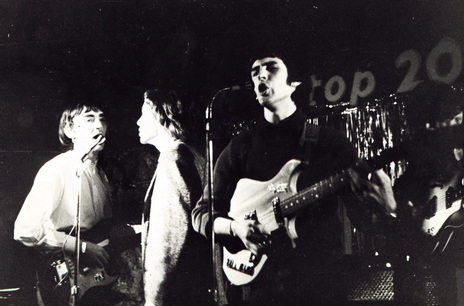
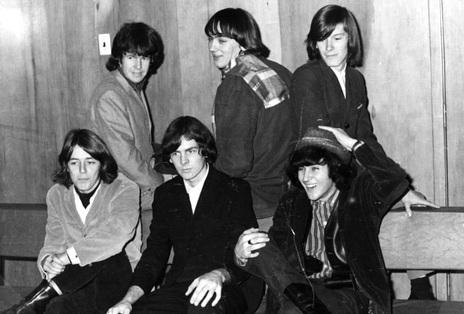
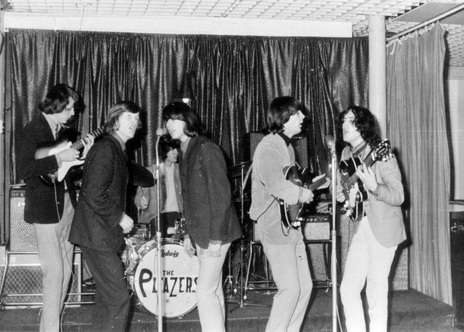
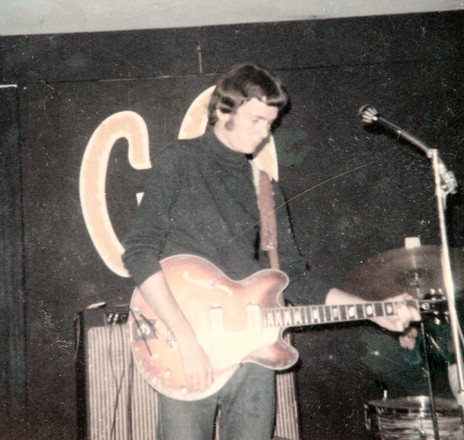
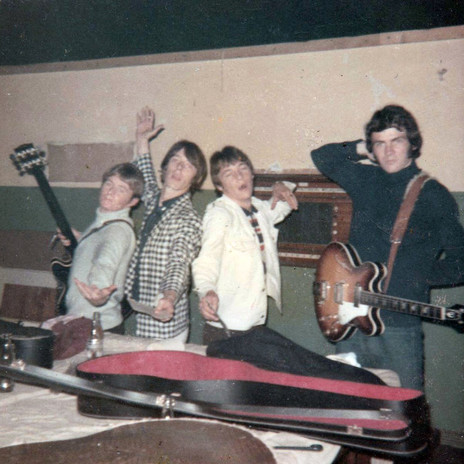
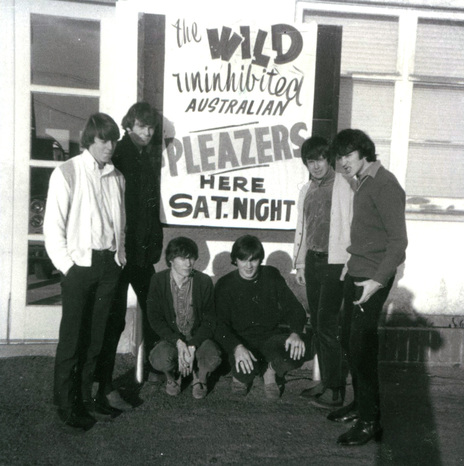
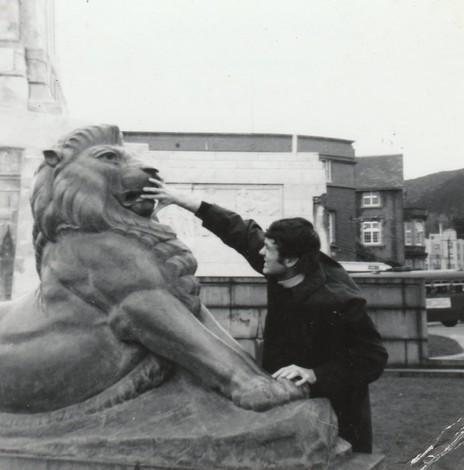

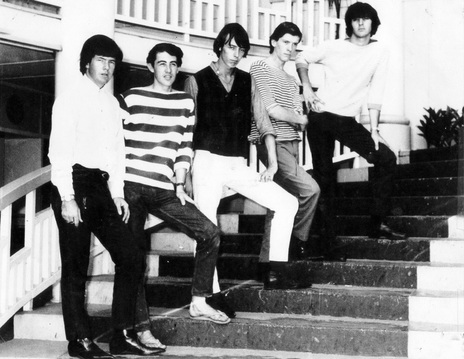
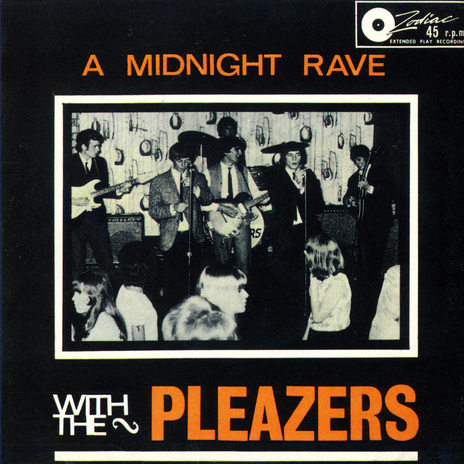
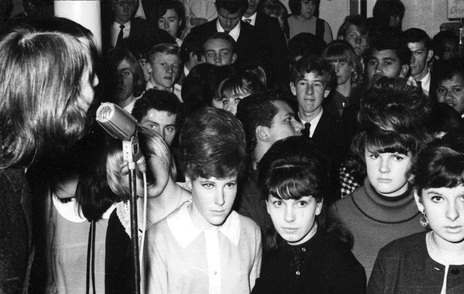
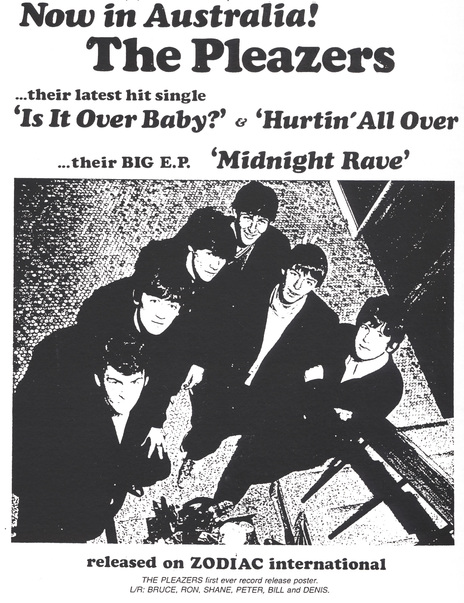
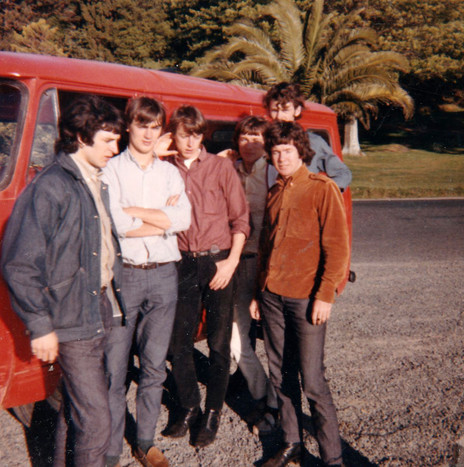
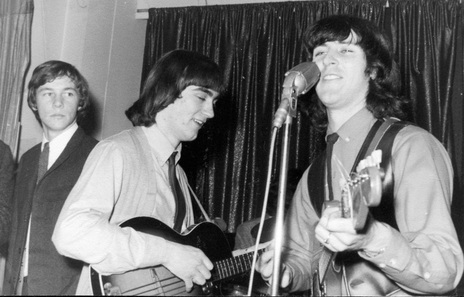
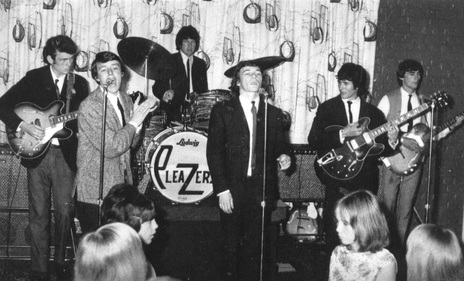
Billy Bacon - vocals
Bob Cooper - vocals
Bruce "Phantom" Robinson - lead guitar
Peter Newing - guitar, vocals
Ron Peel - bass
Gus Fenwick - bass
Denis Gilmore - drums
Visit our sister site
NZ On ScreenMade with funding from
NZ On Air